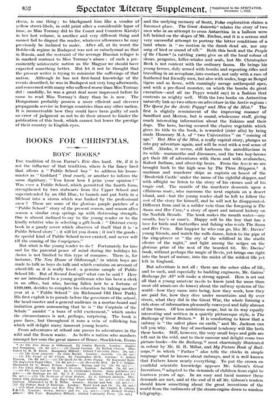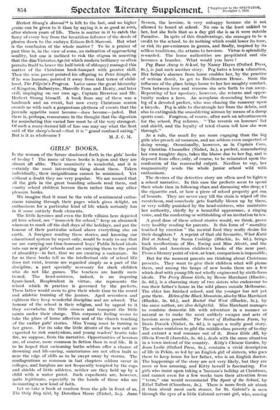BOOKS FOR CHRISTMAS.
BOYS' BOOKS.*
THE tradition of Dean Farrar's Eric dies hard. Or, if it is not the influence of that tradition, where is the fancy bred that allows a " Public School boy " to address his house- master as " Goddard " (tout court), or another to inform the same dignitary, " You know how I prize your opinion ? " Was ever a Public School, which permitted the fourth form, strengthened by two stalwarts from the Upper School and superintended by an Old Blue, to launch and put forth in a lifeboat into a storm which was funked by the professional crew ? These are some of the glorious purple patches of a "Public School" story of the present season, and season after season a similar crop springs up with distressing strength. One is almost inclined to say to the young reader or to the kindly relative who is selecting a gift-book : " Distrust every book in a gaudy cover which observes of itself that it is ' a Public School story ' ; it will let you down ; it isn't the goods ; its special kind of Public School never existed, and never will till the coming of the Coqeigrues."
But what is the young reader to do ? Fortunately for him and for the parental peace of mind during the holidays his choice is not limited to this type of romance. There is, for instance, The New House at Oldborough,' in which boys are made to talk as boys do talk and which contains an account of school-life as it is really lived—a genuine sample of Public School life. But of Second Innings 2 what can be said ? Here we are introduced to a young gentleman who has been a clerk in an office, but who, having fallen heir to a fortune of £100,000, decides to complete his education by taking another year at a " Public School " (in Richmond Old Deer Park). His first exploit is to parade before the governors of the school, the head-master and a general audience in a mortar-board and imitation gown announcing that he is " the Carptain of the Schule " amidst " a buzz of wild excitement," which under the circumstances is not, perhaps,' surprising. The book is pure farce, but throughout it runs a vein of rollicking fun which will delight many innocent young hearts.
From adventures at school one passes to adventures in the wild and the frozen waste. -• As befits a nation who numbers amongst her sons the great names of Bruce, Shackleton, Evans
• (1) The New House at Oldborough. By Gunby Hadath. London: Hodder and Stoughton. 13s. 8d. net.l-(2) Second Innings. By Hylton (leaver. Illus- trated by H. M. Brock. Humphrey Milford: Oxford I:Adversity Press. 18s. net.) —(3) The Great Antarctic. By John Marie. London: Jarrolds. [11s. 8d. net.) —(I) The People of the Chaim). By Christopher Beck. London: C. Arthur Pearson. 13s. 8d. net.]—(5) The Quest for the Arctic Poppy. By Raymond Ralle. The Boy's Own Paper Office. 13.s. 8d. net.1—(8) Men of the Mist. By T. C. Bridges. Illustrated by G. Henry Evlson. London: Harmp and Co. 138. ed. net.)--- (7) The Three Skippers. By Robert Overton. London : Jarrolds. (3s. 8d. net.) -(8) The Swan and her Crew. By G. Christopher Davies. Same publisher and price.—(9) Railways for AU. By J. F. Gairns. London: Ward Lock and Co. 188. net.)--(10) 'f he &the zys of Great Britain. By G. Gibbard Jackson. Illus- trated with photographs. The Boy's Own Paper Mice. [5s. net.1—(11) On the Railway. Illustrated by II. R. Millar. London: Markle and Son. [Is. net.)— :12) Jig Picture Book of Railways. London: Ward Lock and Co. Its. ed. net.] —(13) Great Inventions and Row They Were Invented. By Charles R. Gibson. r.a.s.E. London: Seeley, Service and Co. 15s. net.)—(14) Herbert Strange annual : 16th Year. Humphrey Milford Oxford University Press. [5s. net.1 and the undying memory of Scott, Polar exploration claims a foremost place. The Great Antarctic' relates the story of two men who in an attempt to cross Antarctica in a balloon were left behind• on the slopes of Mt. Erebus, and it is a serious and very successful attempt to portray the bitter conditions of a land where is " no motion in the dumb dead air, nor any song of bird or sound of rill." Both this book and the People of the Chasm* (a rattling yarn) give us all the local colour of skuas, penguins, killer-whales and seals, but Mr. Christopher Beck is not content with the ordinary fauna. He brings his young heroes, duly armed with bombs and repeating rifles and travelling in an aeroplane, into contact, not only with a race of feathered but friendly men, but also with moles, huge as Bengal tigers and as fierce, with cunningly savage anthropoid apes, and with a pre-flood monster, on which the bombs do great execution—and all (as Pepys would say) in a fashion that contents us mighty well. With the two books on Antarctica naturally link up two others on adventure in the Arctic regions : The Quest for the Arctic Poppy 6 and Men of the Mist.6 The first is slightly reminiscent of the improving manner of Sandford and Merton, but is sound, wholesome stuff, giving much interesting information about the Eskimo and their dogs. The hero, having secured the elusive vegetable which gives its title to the book, is rewarded (inter alia) by being made Honorary M.A. of " two Universities " on " coming of age." But Men of the Mist, a really capital story, plunges us into gay adventure again, and will be read with a real sense of thrill. Alaska, it seems, still harbours the antediluvians in its wilds—mammoths and dinosaurs, and the 'two boy-heroes get their fill of adventures with them and with avalanches, Kaloot Indians, and silver-tip bears. From the Arctic we are brought back to the high seas by The Three Skippers.' A madman and murderer ships as captain on board of the `Broderick Castle' under the name of the rightful skipper, and with affright we listen to the story of his crimes and of his tragic end. The mantle of the murderer descends upon a villainous mate, who maroons the next captain on a desert island, and—but the young reader shall be left to follow the rest of the story for himself, and he will not be disappointed. Different from and in a milder vein than the foregoing is The Swan and Her C'rew," a story of sport and natural history on the Norfolk Broads. The book makes the mouth water—any mouth, boy's or man's. Happy will be the boy that has a love for birds and butterflies and fishing who reads The Swan and Her Crew. But happier he who can go, like Mr. Davies' young friends, and watch the ruffs dance, listen to the pipe of the ring-plover or " the cry of the wildfowl in the starlit silence of the night," and light among the sedges on the glorious prize of the nest of the bearded tit. Mr. Davies' book, without perhaps the magic of Bevis, yet brings one right into the heart of nature, into the midst of the wildest life yet left in England.
But adventure is not all : there are the sober sides of life, and to such, and especially to budding engineers, Mr. Gairns' Railways for All' will make a strong appeal. Here is set out all that a young amateur needs to know (and far more than most old amateurs do know) about the railway systems of the world—how they came into being, how they work, how they are paid for, how they dive under mountains and fly over rivers, what they did in the Great War, the whole forming a rich store of information pleasantly conveyed and fully abreast of the times. Of less ambitious scope, but in its way equally interesting and written in a quietly picturesque style, is The Railways of Great Britain." It is comforting to know that a railway is " the safest place on earth," and Mr. Jackson can tell you why. Any boy of mechanical tendency will like both these books. Still, however, the very small boys and girls are left out in the cold, and to their succour and delight come two picture-books--On the Railway," most charmingly illustrated in colour by Mr. H. R. Millar, and My Picture Book of Rail- ways," in which " Father " also tells the chicks in simple language what he knows about railways, and it is well known that Fathers know nearly everything. To put the crown on youthful scientific knowledge appears Mr. Gibson's Great Inventions," adapted to the demands of children from eight to fourteen years of age. In an easy and lucid manner these demands are met, and at the end of it all Mr. Gibson's readers should know something about the great inventions of the world from the rudiments of the steam-engine down to wireless telegraphy. Herbert Strang's Annual" is left to the last, and no higher praise can be given to it than by saying it is as good as ever, after sixteen years of life. There is matter in it to catch the fancy of every boy from the breathless follower of the deeds of pirates down to the embryo Edison-Bell-Marconi. But what is the conclusion of the whole matter ? To be a praiser of past time is, in the view of some, an indication of approaching senility, but one is inclined to risk the stigma in asserting that the dim Victorian Age (at which modern brilliancy so often permits itself to heave the half-brick of obloquy) managed this matter of the Christmas book-banquet with greater skill. Then the wise parent pointed his offspring to Peter Simple, or if he was humane, pointed it away from that terror of child- hood, The Pilgrim's Progress. Later came the great hierarchy of Kingston, Ballantyne, Manville Fenn and Henty, and later still, impinging on our own age, Captain Brereton and Mr. Herbert Strang himself. A book from any of these was a landmark and an event, but now every Christmas season crowds us with such a gargantuan plethora of events that the juvenile appetite must become—does become—jaded. But there is, perhaps, reassurance in the thought that the digestion for assimilating this varied fare must be of the very strongest. Of such a many-itemed bill of fare one may say what the Scot said of the sheep's-head—that it is " grand confused eating."



























































 Previous page
Previous page